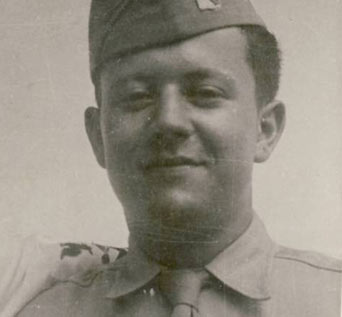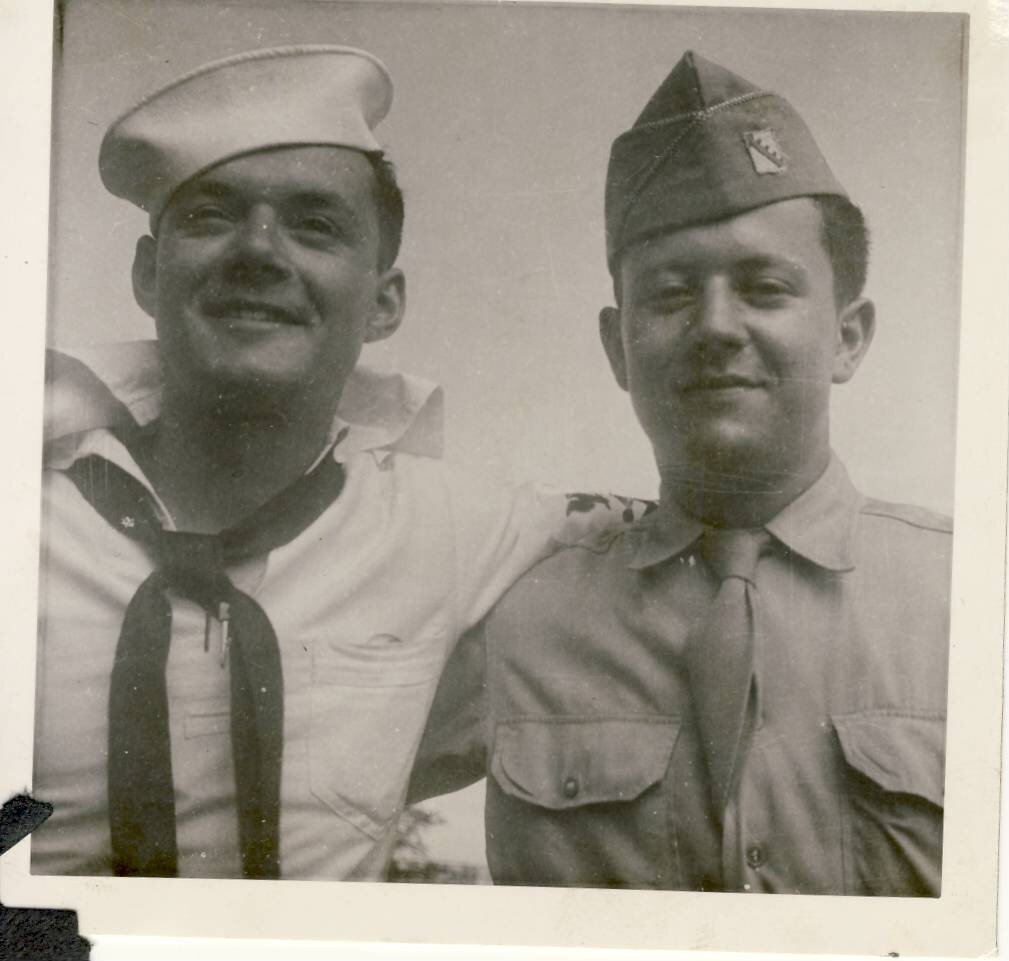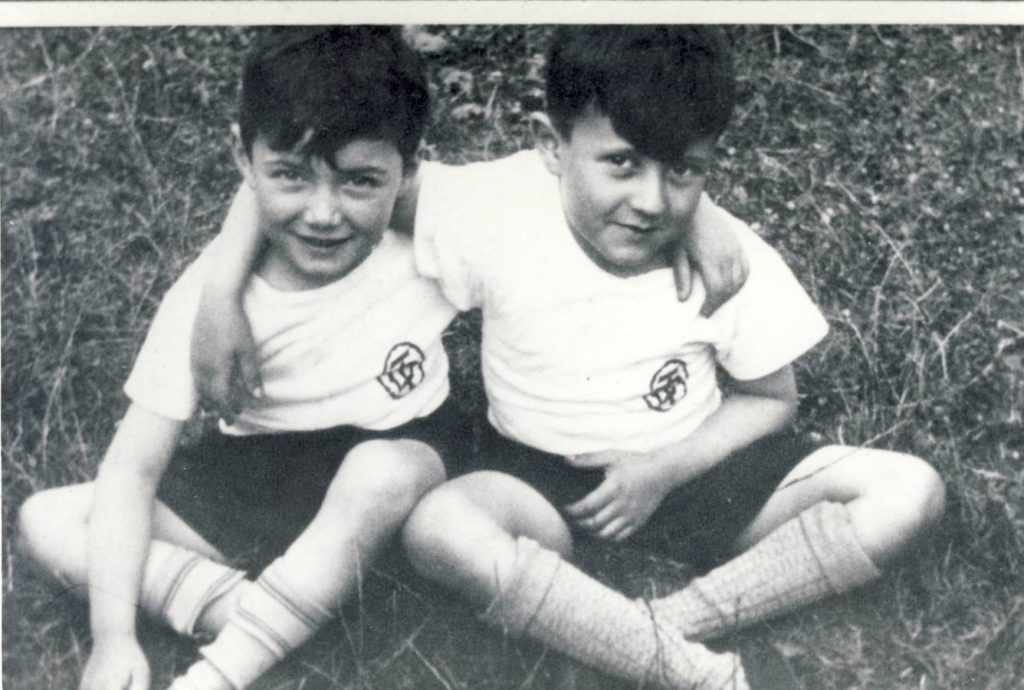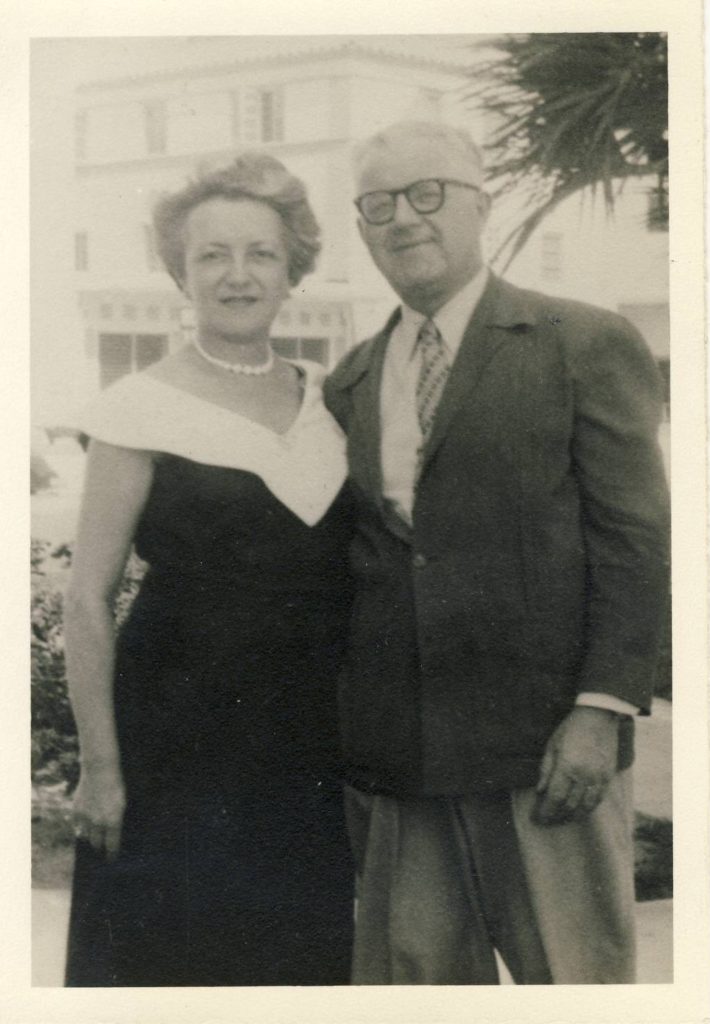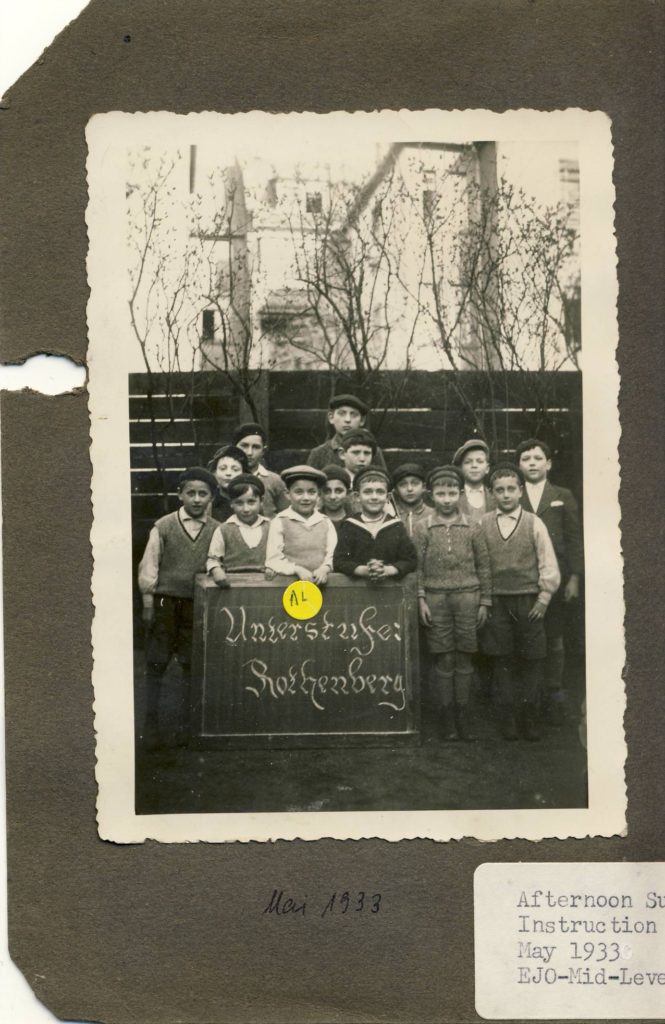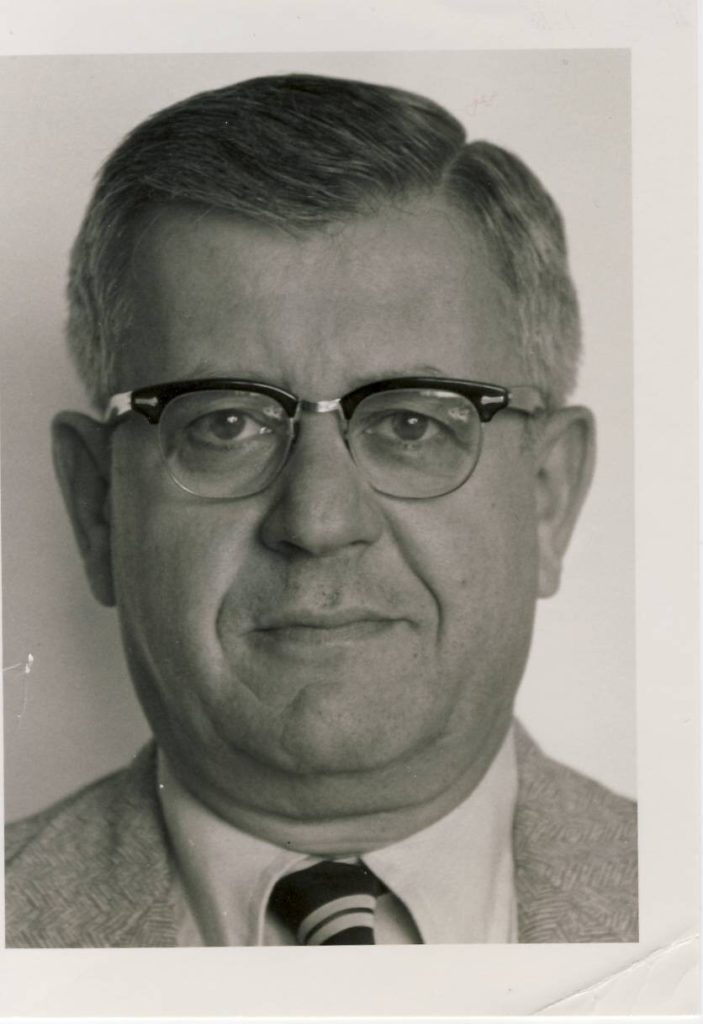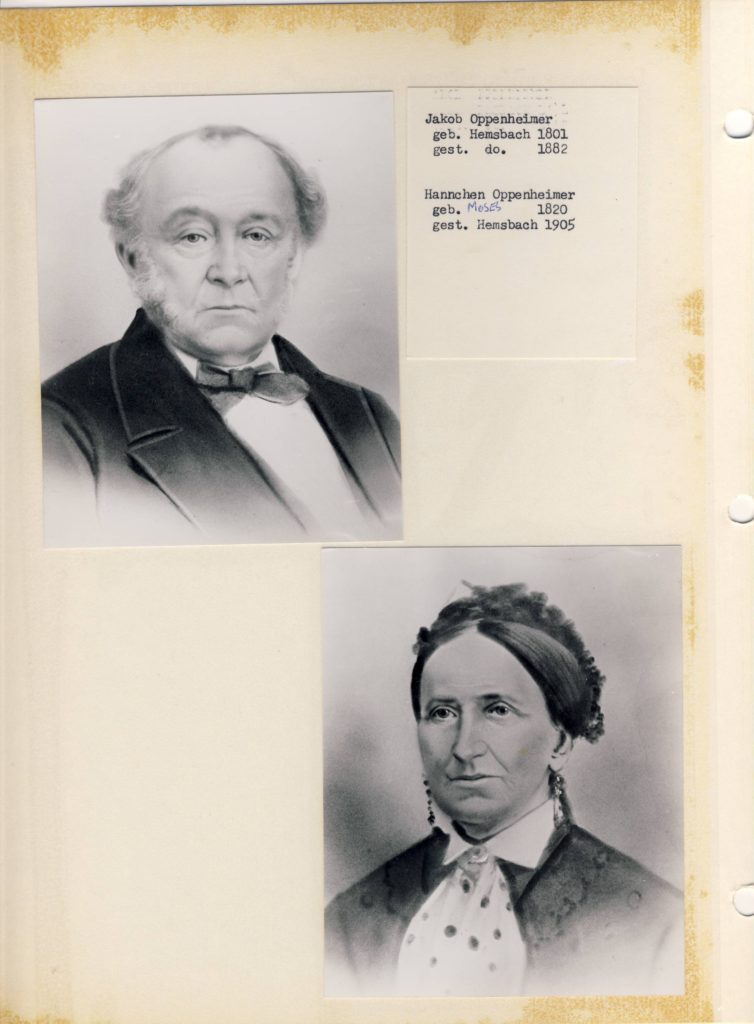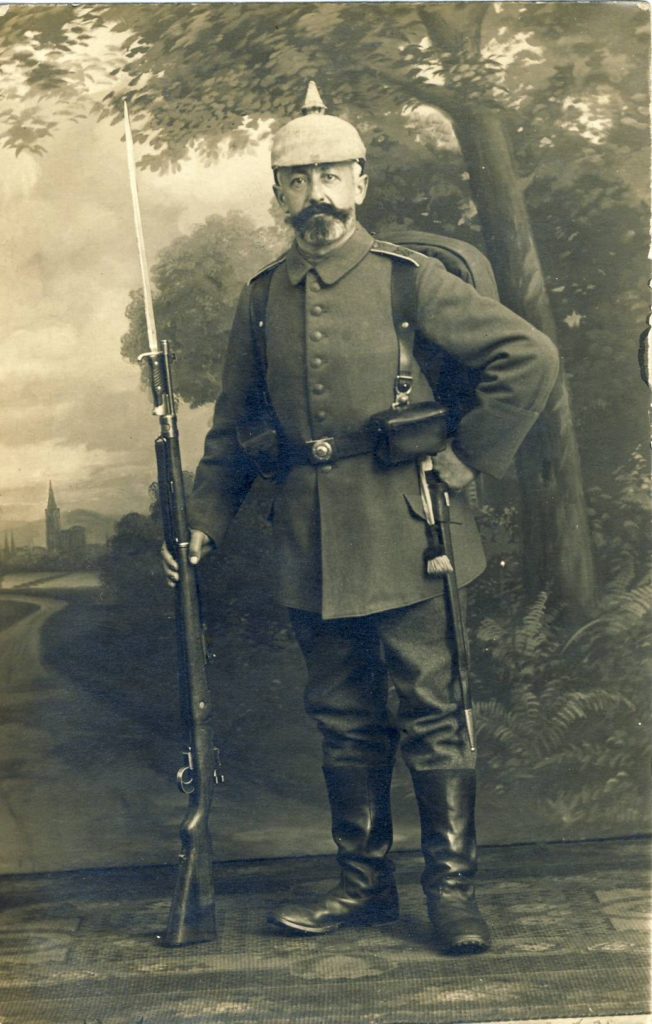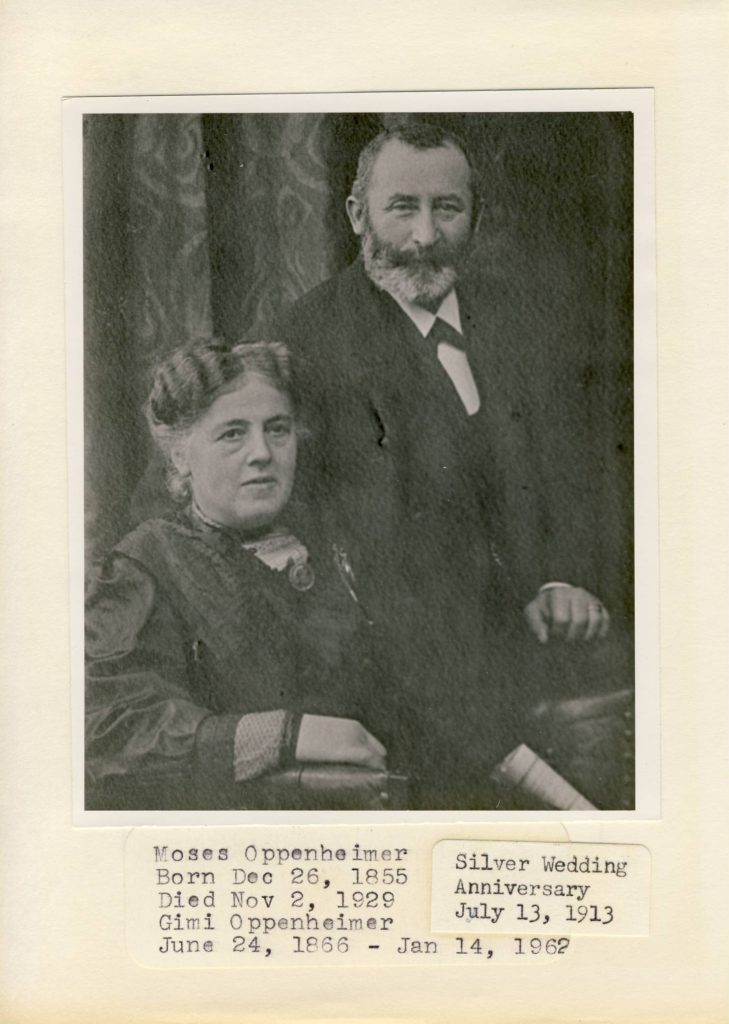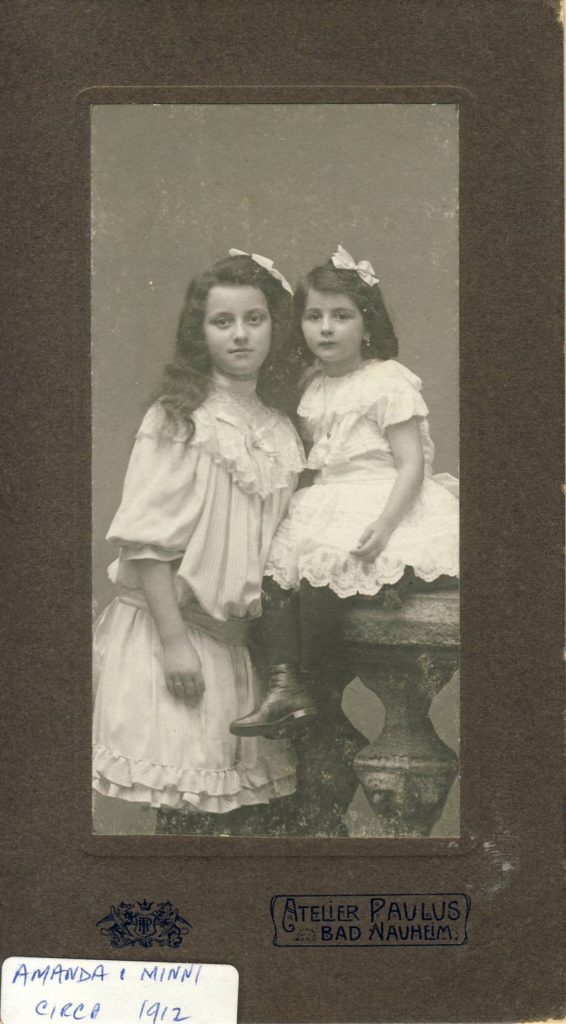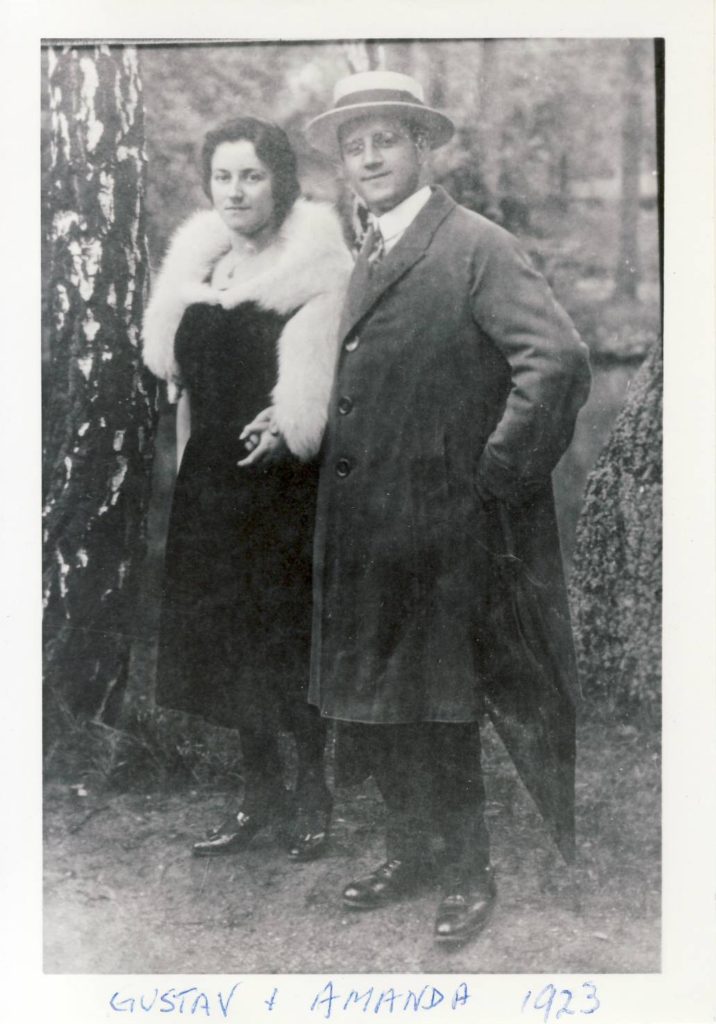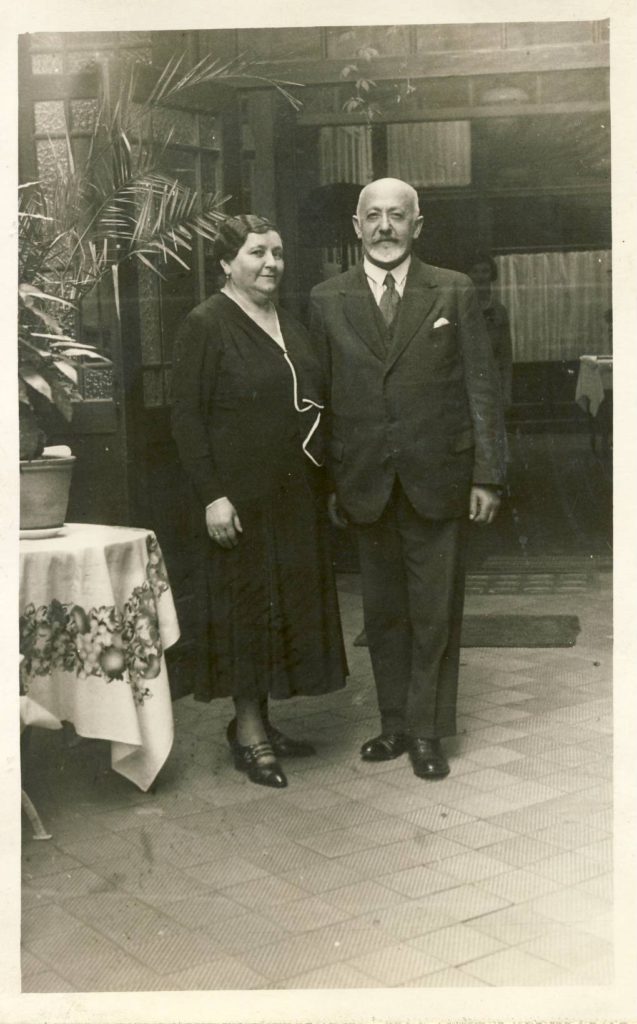EPSTEIN: This is Hedy Epstein and I’m a member of the Oral History Project of the St. Louis Center for Holocaust Studies. This is January 19, 1986. I’m interviewing Eric Oppenheimer.
OPPENHEIMER: My name is Eric Oppenheimer. I was born in Frankfurt am Main on July 16, 1924 in Gemeinde Krankenhaus on Gagerstrasse 36. I have one brother, Alfred, born October 29, 1925 who went on aliyah in 1950 and spent some time back in the States and re-immigrated in 1977. Unfortunately, we lost him November 1, 1985. I have recently returned from a trip to Israel and attended the dedication of the Mazzevah ceremonies, which were elaborate and very moving.
My parents are native Germans, although not from Frankfurt. My father was born in Hemsbach an der Bergstrasse, December 26, 1892. The Oppenheimer family has demonstrably been in Hemsbach since the early 1700s. I have documentation to that effect. My mother was a native of Bad Nauheim in Hessen, February 17, 1898.
EPSTEIN: And may I interrupt you, please. What is your father’s name and your mother’s name?
OPPENHEIMER: Gustav and Amanda.
EPSTEIN: Okay.
OPPENHEIMER: Her parents operated a kosher hotel, a well-known hotel, Floersheim Bad Nauheim in Hessen from the early part of the century until my grandfather was forced to sign away his property in 1939. He – when he left Germany in 1941, he had to go by way of Lisbon, waiting in vain for his younger daughter, my Aunt Minnie, to join him and to continue to Havana – to Cuba. She was never let out of Germany and perished there. The Nazis deported her to Poland and from the best information we have, she perished in Lodz at the time of a typhus epidemic. There was great starvation and hunger in Lodz. I have read the book on the ghetto of Lodz by Lucian Dobrocziski and this gave a great deal of detail and may be of some interest.
In the summer months, my mother, my brother and I would be in Bad Nauheim to help operate the hotel. My father traveled a great deal all over Europe and he would join us sometimes on weekends. His business consisted of the distribution of a celluloid doll made in Babenhausen and he tried to sell this in every European country and was gone for extended periods of time. He explained to me one time that if he would go back to Germany for a weekend, he would have to follow through on visa application and travel application for each weekly visit and therefore he preferred to stay out over the weekends for two, three, four weeks on end.
We visited frequently in Hemsbach as children and sometimes by car on Sundays in the 30s, primarily between 1932 and 1938, when my uncle acquired a car and it was about a two hour automobile trip from Frankfurt to Carmstadt and to Hemsbach. Hemsbach, although the population is only about 2500, has a Jewish cemetery, which is about 500 years old and serves 40 Jewish communities in the area. Bad Nauheim is well-known for its waters. Heart patients from throughout the world came to Bad Nauheim, Jewish people from the United States, from Russia, from Poland, from South America, from east Asia – from all over the world – came there for the waters and the Hotel Floersheim cuisine was widely known and attracted a good trade.
In 1938, possibly earlier, we were making preparations to emigrate. My father succeeded in selling his business at a less than value price to a German enterprise and he consciously took his successor around to his clientele. However, the Nazi authorities continued to find taxes due and were continually auditing his books, so there was some delay. When we did leave, we did so without farewells to neighbors because we left at night, on a Saturday night, got a train to Holland and spent a weekend in Amsterdam or Zandvoort on the sea. You see, he was afraid they would find some additional tax due and would slow up progress and detain him.
I recall at this point that the train that took us to Amsterdam contained my father, my mother, my brother, myself, and my paternal grandmother. We were all in a second class compartment except my father who had taken a sleeper because it was known that the border police would disturb occupants in the first class compartments less, and we had no difficulties at all at the border. I remember the SS guard being exceedingly courteous to my aged grandmother. For reasons that I am not sure, we did not proceed from Zandvoort together. My father had passage booked on the New Amsterdam, a Dutch liner, which he caught in Holland within a week of our arrival. However, the other four, that is my grandmother, mother, my brother, and I took a channel steam ship to Southampton, spent a few days in London, and boarded the SS Hansa, a Nord-Deutsche Lloyd steamer at Southampton. In hindsight, the objective must have been to avoid at all costs that my father would be subject to German detention again in a German residence and we avoided this by having him board the Dutch liner, New Amsterdam.
EPSTEIN: When did that happen in 1938?
OPPENHEIMER: It must have happened right – I do know we crossed the channel on the day after Yom Kippur and I can determine the date if you’d like to have it. I’ve got a perpetual calendar. His departure from Amster – from Rotterdam was a few days later but he was in America and he greeted us in New York. He traveled with his brother and wife. I, I don’t know why we couldn’t get tickets. Apparently we needed foreign currency for the Dutch line and German money to buy those tickets. We had no money – just – my mother couldn’t tip the steward, a ridiculous man – he made fun of it – because we had none. There were limits to what you could take out at that time.
EPSTEIN: Do you remember how much money you were allowed to take out?
OPPENHEIMER: No. I think something like 10 marks in cash – a ridiculous amount.
I would like to talk about my Aunt Minnie who didn’t get out. My Aunt Minnie Floersheim, married Stern, was then managing the hotel and it was due to her exceedingly conscientious – her excessive conscientiousness – that she didn’t get out. She had packed and had arranged for our lift van to be sent through a Dutch port and on to us in America. However, the war broke out, that is the Nazi invasion of the lowlands, and Holland in particular, so she – we called the lift van and reshipped it through the eastern route by way of Vladivostok and Shanghai. It never reached us even though I made efforts when I was in the Orient at the end of 1945 as a G.I. with the U.S. forces in Japan. I contacted all three of the names I had and I received response from all three but none of them had any indication that the lift van came through their hands. So, it was totally lost.
My Aunt Minnie Stern was a nee Floersheim, born in Bad Nauheim, December 8, 1904. She married a man named Alfred Stern who came from an extremely assimilated family. Eventually he became ultra-orthodox and died in summer of 1985. However, in 1939, he was arrested by the Nazis and put in a camp. Although deathly ill, my Aunt Minnie managed to smuggle him out through means that were never told me, got him to England, where he recovered and was promptly arrested by British authorities. They interned him and sent him to the Isle of Man where he stayed for about six months and was from there transferred to a prison camp in Australia where he remained the rest of the war years. In 1945 he came to the United States, but rather than settle with us, his only family, he preferred to go to New York. He said he would never get married again, but he found a woman who reminded him very much of his wife, of his late wife, and he did remarry. The widow survives him. He died – Alfred Stern died, in July 1985.
As far as my grandfather, Hermann Floersheim, was concerned, the hotel operator at Bad Nauheim, he was to meet Aunt Minnie in Lisbon in the fall of 1941. However, at that point the Nazis passed legislation forbidding persons under age 45 to leave the country but instead report for forced labor camps. She was 37 at the time. However, he proceeded to Lisbon and waited a week or two and then took passage to Cuba. He stayed in Havana for one year to await the U.S. quota. The German quota for immigration to the United States had been filled. This made the stay in Cuba necessary. My father sent him weekly checks to sustain himself. His efforts with the HIAS were fruitless. He could never borrow anything from HIAS. It depended entirely on my father in Chicago.
Alfred Stern did quite well in New York. He remarried and has a son, Joshua, now 36. And my grandfather came to us in Chicago, after having spent the one year waiting period in Havana, in November of ’42. He was surprised to find cold weather. He came in a white linen suit. It was bitter cold in Chicago. He pursued studies of English with great vigor, having just completed studies in Spanish, all of which were foreign to him. To the point where he successfully completed his examination for U.S. citizenship which was granted him in time to make demand upon the German authorities to reclaim his property in Germany, and it was returned to him. He died in Chicago in December – January 7, 1953. He died January 1953. My grandfather’s wife, my grandmother, Helene Floersheim, was born August 15, 1868 in Braunsbach in Hessen and she was the heart of the hotel operation in Bad Nauheim where she died November 23, 1935. It was at this point the heavy responsibilities of operating the hotel devolved on my Aunt Minnie and her health suffered from this. The original plans for Minnie Floersheim, married name Stern, and her husband, Alfred, were to emigrate to Israel at the time of their marriage in 1933 because Alfred was a trained and degreed agriculturist – agriculturalist. However, they were prevailed to stay in Bad Nauheim and operate the hotel as their parents were getting on in age. At this point, I would like to review my paternal grandparents.
My grandfather, Moses, was born December 26, 1855 in Hemsbach, and died there in November of 1929. I was five years of age at the time and have very fond and extensive memories of him. His wife, my grandmother, Gimi, nee Weingaertner, from Flehingin in Baden, was born June 24, 1866 and died in Chicago in her 96th year in 19 – January 14, 1962. Even my son remembers her. It’s enough about grandparents.
Going back to Bad Nauheim, in 1930 and 1931, I attended the public school for about two or three months each in the spring when my mother was assisting with the hotel operation. In this public school there was one other Jewish student, a girl by the name of Irene Spiegel. If there were any anti semitic incidents, they were inconsequential. But we did have friends among the Gentile population that my brother and I would play with and it was quite painful to come in one spring and find they no longer knew us. This was our early exposal to Nazi doctrine, having relations with Jews.
EPSTEIN: Do you remember what year that was?
OPPENHEIMER: In – I would say it would be 1935, 1934 – ’35. The rest of the year I went to the parochial school of the Austritt Gemeinde in Frankfurt, which is called the Sampson Raphael Hirsch Real Schule and its affiliate grade school. There the student body was 100% Jewish.
When we came to the United States, I went to the eighth grade for a few months and went on to the First Englewood High School in Chicago, and I graduated from Hyde Park High School in Chicago in 1942, in January.
My upbringing was Orthodox. My father was an elected official of the Gemeinde Synagogue am Boerneplatz, the main synagogue of the kehilla of the Jewish community in Frankfurt, as distinguished by the Austritt’s Gemeinde which was founded in the 1850s by B’Aley Batim who called in Sampson Raphael Hirsch. My father would have a tour of duty about every six or eight weeks on the Shabbat where he would be on the bimah wearing a silk top-hat. It was a policy of the synagogue at that time to attract some of the younger Orthodox and observant members to do their share – to assume some of the functions that had at that time been done by the older membership. Although my father was often not home for the weekend, they had a strictly serving kosher home, he would rush in on Friday evening – if he was home, he would rush in and go to shul. And we would invariably walk in at Lecha Dodi and I never knew that there was anything preceding that until much later. He went early. He walked to services on Shabbat although in later years sometimes he would take a streetcar on the weekdays. It was about a mile walk. The synagogue building was built in 1882 and there is a famous painting of it by Max Beckmann, a surrealist painting, which he did in 1919. I’m submitting a picture taken from a Frankfurt memorial book, which I have in my possession. It was a large building, seating over 1800, with women’s seating in a balcony in a horseshoe fashion on the same level on the front and above the – our own Aron HaKodesh, a place for the male choir, and I have fond memories of the choir. The services were very impressive.
For Mincha we would go to shul again, probably in the Weissenhaus, the orphanage, which was closer to our home. And for Maariv we would return either to the Weissenhaus, the orphanage, or back to the main shul a mile away, and probably would attend a shiur, some kind of a lesson. But I had quite a bit of training during the week in my regular schooling until in the last year we were there, they had to close school down partly because of a polio epidemic.
I would like to cite a few incidents at this point in my recollection of what I recall of the Nazi period and how it affected us, my brother and myself. First, I thought of myself as looking extremely Jewish and wearing a cap, which was a school requirement. It was obvious to anyone that we were Jewish, and we might receive a few rocks. I remember one in particular coming through our sukkah. That was in Bad Nauheim. And mostly taunts by others. I already mentioned the non-recognition by former playmates, which occurred probably in the mid-30s. Other than that, I recall the Juden Sind Hier Unerwvenscht signs and those were markers asking, “Jews not desired here,” but were prominently displayed in retail stores, discouraging Jews from shopping.
I recall the boycott of 1933. On a Saturday morning, Nazis would stand outside of the Jewish owned department stores and put rubber stamps on the hands and faces of those who would enter. I remember that I could not go to Nordeney anymore, which was a north Friesan island in the North Sea. Sea air was prescribed in those days for people who had a tendency to get sore throats. This was before antibiotics and penicillin and such. The other thing that stands out in my mind are the Brown shirts marching in the streets with their swastika armbands singing threatening songs like “Wenn’s Judenblut vom Messer Spritzt,” “Haengt die Juden,” and “Stellt die Bonzen and die Wang.” It’s not too difficult to imagine that this type of “music” makes an impression on teenagers.
EPSTEIN: Do you want to translate that, if…
OPPENHEIMER: “Wenn’s Judenblut?”
EPSTEIN: Yes.
OPPENHEIMER: “When Jews got splashes from the knife,” “vom Messer Spritzt dasweiss ich nicht.” I don’t know what that is. “Hang the Jews, put the bastards against the wall.” Threatening – at that time it was not readily dismissed even though at that time physical outbursts were rare. I know instances, but I didn’t witness it except arguments, verbal arguments I remember in Bad Nauheim when the Nazis, the Brown shirts who were not soldiers and were not police – they were party members – argued about claimed abuses with members of my family, particularly Alfred Stern, I recall. There was a heated discussion but nothing physical. There were many incidents of physical – I have a cousin, an older cousin, the brother of this woman for whom this affidavit is, who was beaten to death by the Nazis early in the 30s. Okay.
I finished high school in 1942 and I accepted employment with the Independent Casing Company in Chicago and stayed in the capacity of a receiving and shipping clerk, and stayed until I was drafted. At the same time, I enrolled at Northwestern University night school on the Chicago campus and took courses in accounting and economics. I went on active duty May 8, 1943, and because I was not a citizen, I was put in what was termed a “non-combatant service,” in this case the Medical Replacement Training Corps, inducted at Fort Custer, Michigan – or Camp Custer, Michigan. I was sent to Camp Grant, Illinois for basic training. This is near Rockford, Illinois, only 90 miles from Chicago. Upon completion of basic training, I was the only one selected to report to the commanding general at Camp Breckenridge, who assigned me to the 90th Infantry Division, which had a vacancy in the medical unit. That was the medical unit supporting the Divisional Engineer Group. I was soon put in charge of the – was a non-com in charge of the unit. From Camp Breckenridge, we shipped out in April of ’44 to Fort Lewis, Washington and went to Hawaii. In between Oahu and Kawai, we spent the next 18 months on the Hawaiian Islands. At one point I was able to enjoy the visit of my brother who was in the navy, and en route to Iwo Jima where he did electronic work on planes accompanying the B-29s at that time bombing Japan. We left Hawaii in – I think it was in late July on board a small craft. It took 40 days to reach the Japanese shores. In the meantime, the atomic bombs had been dropped and we did not need to invade Japan but served as occupation troops. I left for home early in February and was discharged February 17, 1946 at Camp Brand, Illinois.
Where do we go from here? I scouted around for a college that would accept me. My preference would have been to resume at Northwestern University where I had taken night courses before entering the military; however, their quota was full and I would have had to wait a year. Instead I entered DePaul University and got a degree in business management in January 1949. I worked very briefly at a job, but my family firm, Oppenheimer Brothers, which was founded during the war by my father and his brother, Karl, needed my services and I joined there at first in the office doing packing and secretarial work, and later on traveling on the road. That was beginning in July 1950, an activity to which to a large extent the following 35 years and I am at this time still traveling, although not as much as I did at one point.
On a weekend in 1952 I decided to spend a few days in the St. Louis area. I did this a number of times, but in August of that year, I met Beatrice Goldberg through a quirk. I met her brother, Samuel Goldberg, at the Pioneer Country Club in New York State, the “Borscht Belt” resort. And in talking to him I found that he had a brother who was an attorney, they had all lost their father recently, and he said, “Sometime when you spend a weekend in St. Louis, come look me up.” I did this on August 24, 1950…in 1952 and was invited to stay for lunch and this is where I met my future wife, Beatrice. We were engaged the Thanksgiving following and married Lag B’Omer, which was May 3, 1953. We lived in Chicago. From St. Louis we went on a honeymoon in Florida and returned to St. Louis in time for Shavuot, the Pentecost holiday, and took our things following, rented a trailer, and moved to an apartment in Chicago about two blocks from my parents’ home.
I continued with my activity and Bea was alone until Howard was born July 21, 1954. The neighborhood on the south side where we lived deteriorated and we looked around to move into a Chicago suburb, either Skokie, Lincolnwood, or northern parts of Chicago. We also investigated some south suburbs and having reviewed all factors involved, decided to move to St. Louis. I had undergone an illness which was partially disabling. And I thought it would be best for Bea and Howard – Bea doesn’t drive and Howard at that time was too young to drive – where they would have some mobility in case of my disablement, which was more likely than unlikely at the time. And therefore, we located a home in the St. Louis area where we reside to this date.
Howard was married January 4, 1976 to Jackie Feldman. They have two daughters, Mandy age seven and Dalia age four. Both are named for my parents. My father Gustaf’s name is Gedalia, hence Dalia, and my mother’s name was Amanda. Our children saw to it that my parents were perpetuated.
I will attempt to describe the nature of my father’s business. It had two aspects. One was that he had the exclusive distributorship of a celluloid doll for entire – for all of Europe. It was made in Babenhausen in Hessen. He traveled around Europe to sell his item. In later years he got much competition from Japan and I remember him getting extremely angry when he saw a Japanese copy of his doll when he visited us in Zanford, Holland in 1935 for a weekend.
The other aspect of the business was the assembly of toilet – toiletry kits. He would buy cases which would hold five, six, ten instruments for pedicure and manicure – scissors and nail files and nail knives and cuticle shears and that type thing. The only recall of a severe economic downturn that I have was in 1931 when the British devalued the pound sterling. All his foreign exports were receivable in pound sterling and with this one stroke of the pen by the English government, he – his business – or at least his accounts receivable were reduced by 50%. He was not one to complain. He continued his contributions to charitable organizations and in addition to that there were members of the extended family who needed continuous support and he never ever failed them.
In connection with my Bar Mitzvah, I recall that on – the Bar Mitzvah itself was on the 26th of June, 1937. Our beloved rabbi, Jacob Hoffmann, had fled a few months previously. He had been threatened. In the recent issue of the book we get from Frankfurt regularly, there is some detail about his forced departure. However, Dayan Kirschbaum, the assistant rav, was there, and we have a very interesting letter which I’m giving to Hedy, how he escapes – how he managed to evade censorship for – although the letter is censored, it had a very clear message which may be of general interest. Other items I recall…
EPSTEIN: May I interrupt you for a minute? Do you want to talk about – do you want to say what that is that was of interest?
OPPENHEIMER: I’ll be glad to. Let’s see, I have it right here. I’m quoting from Rabbiner Kirschbaum’s letter of March 19, 1939, which went through Nazi censorship. In his sixth paragraph he says, “Matzes habenwir hier ziemlich, dafuer morror noch viez mehr. Ich werde diesen Shabbos in Hermesweg und naechsten Shabbos in Shabat Hagadol in der turnalle sprechen.” Translating into English, “Matzos we have plenty. On the other hand, maror, bitterness (he’s using a Hebrew typewriter) is much more. Next Shabbat I will speak in the shul on the Hermiswig, and the following week at Shabbat HaGadol in the Gymnastics Hall.” Okay?
Other incidents that come to mind in the Nazi period, which could be considered of anti semitic nature, are the taunts we received because we were recognizable as Jews, wearing required headwear at all times. Violence we endured to a minor degree, such as receiving rocks while sitting in the sukkah, occasionally rocks thrown at us, and frequent taunts. I do recall the boycott of 1933 and the “Juden sind hier unwewuenscht” signs in the store windows, “Jews not wanted here.” I recall the songs the Brown shirts sang wearing swastikas as they marched in close order formation in groups of 20, 30, 40. Singing highly inflammatory songs about – such as the Horst Wessel Lied which is well known and others containing words as “Wenn’s Judenblut vom messer spritzt dann geht’s nochhal se gut,” which means, “When Jewish brought splashes from the knife’s point things will improve tremendously.”
Then we’d see signs, “Die Juden sind unser ungleuck.” At the congresses, the Nazi congresses, mostly in Nuremberg, there were huge crowds of half a million or more – I think that the public here is familiar with them, and signs of this nature were commonly and frequently seen. The soldier, the military personnel, were very correct in their conduct, as generally were police, at least up to the period when we left.
Another incident I recall was a trip from our parochial school, where we came upon the grounds of a monastery and I recall my teacher conversing in a fluent Hebrew with one of the monks on this outing. Another thing that may be of interest, when we were in Bad Nauheim during the season of the hotel, which is usually from spring through the summer months, one of my jobs was to register guests at the police station. When they left, they were deregistered. This is a common procedure in all police states. It predates the Nazi period and is, to the best of my knowledge, in effect today. But it was easier to send a young teenager to the police station with few embarrassing incidents.
Another thing I recall of that period – a Jewish vagrant was picked up by the police, and I was asked to bring him a meal. Again, I had no problems because it was easier to deal with a young 12-13 year old than with an adult and no untoward incidents occurred against my person. The subject was distraught weeping, but that’s not surprising.
EPSTEIN: Excuse me, the subject was what?
OPPENHEIMER: Distraught.
EPSTEIN: Oh, distraught.
OPPENHEIMER: Rather crying. I didn’t know what he did – probably begging or something. He’d been there before.
The hotel had an international clientele. Although closed for the cold months, we had occasionally one or two persons stayed year round. One was a Russian woman and her name was Margolin. She had world famous daughters. Dr. Rainach was her son-in-law in Paris, I remember, and I remember that she could never get her tea hot enough – boiling was too cold by the time it would get to the room. We had interesting clientele from all around. I remember one time we had a prince from East Asia, from one of the Indo-Chinese French colonies, a very wealthy tin magnate, and his assistant. And he took a shine to my brother and also liked to bounce us on his knee, and with his dictionary tried to ask us all kinds of things.
The hotel had only one bathroom on a floor and there were common jokes about “im Hotel Floersheim, dem netten, da fehlt es an klusetten.” But…
EPSTEIN: Do you want to translate that?
OPPENHEIMER: “In the Hotel Floersheim, a nice, neat place, there’s a great shortage of toilet facilities,” which doesn’t rhyme. In one instance, there was a wealthy American coming and he needed his bathtub, come hell or high water, so a plumbing supply – a place next door – let us use a bathtub and put in temporary plumbing so he had a tub in his room. Going back…
EPSTEIN: May I ask you something – about how many people did the hotel – facilities for how many people?
OPPENHEIMER: Oh, probably – for Pesach we might have 80 guests and that was capacity. And my father would often give the seder on Pesach. He had a good voice and people liked to listen to him. Incidentally, I have in my possession a cup that was given to him by his home kehillah in Helmsbach for doing the service on Rosh Hashanah and Yom Kippur in 1929. Of course, he wouldn’t take any pay.
Returning now to economic activity in the United States after our arrival. My father, having been born in 1892, was 46. My mother was five years younger. I was 14. My brother would be 13 two weeks later and was Bar Mitvahed in our first week in Chicago. They were most accommodating and let him do what he had prepared, which was to do the Torah reading. The shul normally would let the Bar Mitzvah boys read the Haftorah, which he had not prepared at all.
Economic activity in the beginning for my father consisted of utilizing his connections in the department store trade in the northern European countries of Holland, Belgium, Sweden, Norway, and Denmark. He had many friends there and he wanted to act as their buying agent in the United States. He did this quite successfully. His brother, Karl, had a textile background and he managed to represent European textile houses, primarily Belgian, some French, and Czech. People who were interested in table linens, also upholstery fabrics such as the Pullman Corporation in furniture makers. Much of this business ended when the Nazis marched into the lowlands in May of 1940. A switch was then necessary to sell domestic items. My father concentrated more on jackets and some outerwear and military items in the war period. He called them PXs, and my Uncle Karl concentrated more on domestic – it may have been imported items, but not from Europe, such as Chinese made handkerchiefs, silks from Italy, but the war changed all that. And it was during the war years that they formed a business called Oppenheimer Brothers. And in later years it was incorporated. And they were using the same facilities but not doing necessarily the same – selling to the same type of user, retail stores and such, until towards the end of the war when they more or less merged the type of activity and the type of user. Upon my – or even while I was in college, I worked there part-time. This was downtown Chicago.
And in the meantime, in 1969, I had moved to St. Louis, but I continued my activity. In those days, I would come back to Chicago for every three weeks or so. And my father passed away April 1, 1970, on census day, very suddenly and very unexpectedly. He was just going to Milwaukee, he had gone to services that morning, Wednesday morning, and while he was in the office he was stricken. I rushed him to the hospital but he was gone by the time we got there. My brother was in South Bend. He came and stayed with us for a time because I was already living in St. Louis and I returned to St. Louis after the shiva was over. At this time I am still active in sales to the firm to whom we sold Oppenheimer Brothers Incorporated, which is Hayman Corporation in Chicago.
In 1914, Russian students were suspended from the University of Frankfurt and placed under a form of house arrest. They were transferred to Bad Nauheim and established residence under the supervision of the government. Nachum Goldman, the early Zionist who died a few years ago, whose name by the way the Diaspora Museum in Tel Aviv was named, was one of the arrested persons. He founded a Zionist club in Bad Nauheim and my late mother, Amanda Floersheim, was his first member. She was then 16. Her early enthusiasm for Zionism lasted through her lifetime. And my late brother, Alfred, or Asher, in his lifetime put into practice these sentiments by going on aliyah in 1950. He died November 1, 1985.
In anticipation of our departure from Germany and my grandmother in Hemsbach, having left Hemsbach and moved in with us in Frankfurt about 1936, precipitated a step, which in retrospect seems very important. My father asked one of his employees, his name Fuld, to drive to Hemsbach with myself and I believe my brother also, but he had no recall of this, to pick up a Sefer in the synagogue in Hemsbach, which was a beautiful little shul with a balcony for women. We had no difficulties at all. We picked up the Sefer Torah in Hemsbach on a sunny day, wintry day, early in 1938, to the best of my recollection. We took it only to Frankfurt, but I do not know what happened to the Sefer Torah after that. I know we did not leave and take the Sefer Torah with us. There is a book available about the town of Hemsbach, which was published about a year ago. It is presently in the possession of Paul Gusdorf. He talks about the author of the book who is a schoolteacher in Hemsbach, not a native. He moved there and was enthused about the Jewish history of Hemsbach, mentioned a Sefer Torah donated by the Pfaelzer family. Whether this is the same Sefer Torah, I do not know.
EPSTEIN: Do you remember the name of the book – the title of that book?
OPPENHEIMER: I can look it up. Remind me, please. Aside from delivering newspapers and selling them on Sunday, my first job while a student at high school in Chicago was at Jacques’ French Restaurant. I was a busboy. On October 8, 1941 I asked the secretary to execute a certificate showing my income, which was needed – the certificate was needed to back up our family assets to add into our ability to bring in family members, in other words, to support an affidavit. The income at that time – my average earnings at that time amounted to $18 a week. When I would return to school, this would drop to $10 a week. I was then 17 years old, and they assured me of continued employment. Jacques Fumagally. He wasn’t even French…okay.
In the mid 1960s, Germany passed legislation to reimburse emigres, those who fled Nazi oppression, entitling them to a sum for loss due to interrupted education. I received approximately $1066 in this connection. This was called wiedergutmachung, restitution. Okay, now you want me to look for something.


